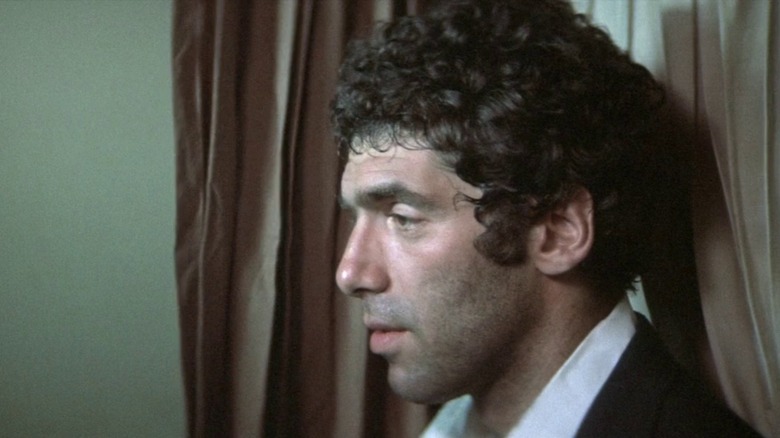
Known for his experimentation, Robert Altman's audio tracks were in a league of their own. The director's unconventional sound mixes — often featuring overlapping voices and noticeable ambient noise — usually mimicked the chaos of real-world audio. Sure, it was harder to understand what any given character was saying, but in return, viewers were treated to a film that felt far more realistic. You might not want to eavesdrop on the extras' conversations, but by having the choice to do so, it was easy to truly feel like a fly on the wall.
In "The Long Goodbye," Altman kicked the experimentation up a notch. The movie would see the famous '40s film noir detective Philip Marlowe (once synonymous with the dapper Humphrey Bogart, now played by a bumbling Elliot Gould) stumble through '70s Los Angeles, still clinging to long-gone notions of honor and loyalty. Naturally, Altman would have to emphasize the fact that Marlowe was a fish out of water — and he had an unconventional strategy to do so.
Always eager to play with audio, Altman wanted the soundtrack of "The Long Goodbye" to include a wide range of variations on a single musical theme. These different iterations (nearly all of which were titled "The Long Goodbye") would pop up everywhere — as background music, a funeral march, a doorbell trill, and an absent-minded tune tapped out on the piano. But the stakes were high: if executed poorly, the repetition could feel like a cheap gimmick. Luckily, John Williams would step in to craft a soundtrack so rich that it truly immersed viewers in the film's world — and fleshed out Marlowe's character along the way.
Similar, But Never Too Repetitive
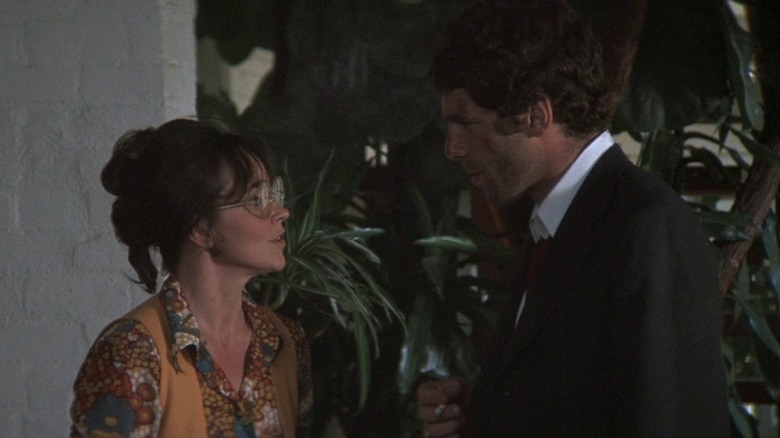
If you've ever discovered a great song, played it non-stop, and then came to hate it within a week or two, you're well aware that too much of a good thing can make it infuriating. On that same note, when a movie with a 112-minute runtime repeats the same tune at least 18 times (the soundtrack lists 17 songs, but doesn't account for the doorbell), it heads into dangerous territory.
To keep the soundtrack from becoming too repetitive, Williams' theme was mixed into a variety of different music styles — jazz, tango, mariachi, and more. Several variations included flashy accompaniments that were heavily influenced by their respective genres, allowing the tracks to practically hide the melody and bring some new music into the mix. And although Williams wrote mournful, catchy lyrics to the "The Long Goodbye" theme, all but two of the soundtrack's songs were instrumental, minimizing the chances of the vocal repetition becoming a nuisance.
Taking A Stroll In Marlowe's Shoes
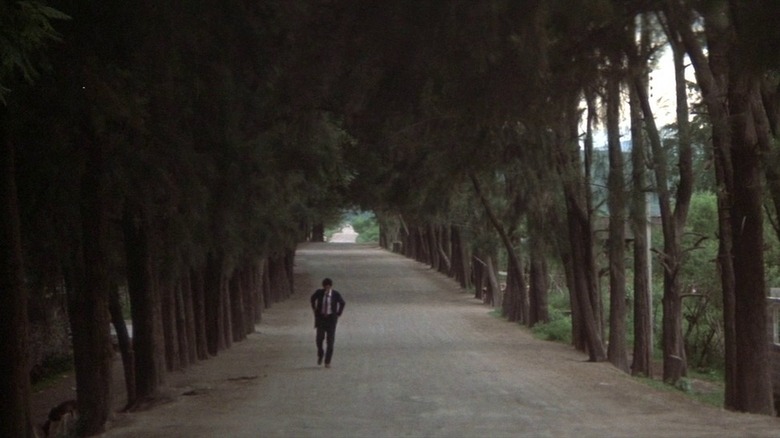
Since the music's repetition ends up being pretty subtle, it's easy to miss when first watching "The Long Goodbye" (sorry to spoil it for you, friend). Nevertheless, whenever the tune plays, viewers are met with an eerie sense of deja vu — and as the melody becomes familiar, each genre-specific interlude comes with a vague sense that something is wrong.
In a way, you're put into Marlowe's shoes. The detective might have a foggy idea of how the world works, but his views are ripped straight from '40s-era noirs; he can't figure out what's happening any more than we can predict the next notes in the mariachi rendition. And so the film chugs along, both Marlowe and the viewer disturbed by misleading, unquestioned expectations.
This is a neo-noir though, so sooner or later, someone's gotta wisen up. Eventually, viewers notice that the soundtrack keeps repeating itself — and only then can we appreciate the true cleverness of Altman's musical experiment. After all, the musical theme's repetition puts viewers in Marlowe's shoes and reminds us that the detective is haunted by a long-gone era, all in one fell swoop.
The Persistent Tune
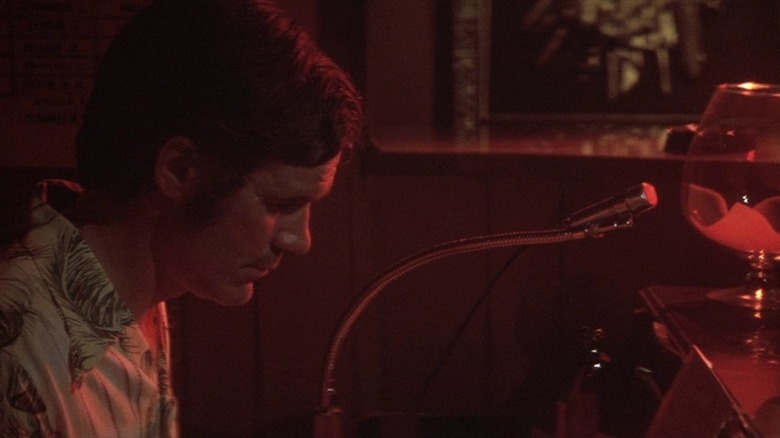
If Williams' constant variations of the "Long Goodbye" theme help us sympathize with Marlowe, the incessant repetition of the underlying tune is a reminder that the detective isn't in the right era, nor can he escape his roots. Whether he's navigating a web of disloyalty or walking past a group of "crazy girls" who practice half-nude yoga outside, the detective is constantly struggling to understand society at large. This isn't to say that he's ever judgemental (Marlowe repeats "that's okay with me" so often that's practically a catchphrase), but — much like Williams' theme — these sources of surprise can't be escaped. No matter how many punches Marlowe rolls with, '70s Los Angeles always seems to come up with another shocking song.
Ultimately, the soundtrack structure's double meaning is a clever trick. Regardless of whether or not the viewer has caught onto the repetition just yet, the music drives Marlowe's characterization in a truly innovative way. It's an impressive feat — and the impact becomes even more powerful once the tune is eventually abandoned.
Escaping The Repetition
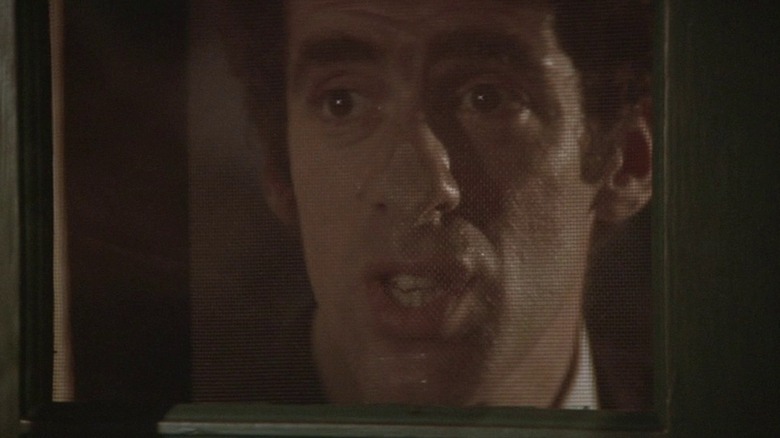
Williams may have composed most of the "Long Goodbye" soundtrack, but there's one song he can't take credit for. The very beginning and end feature renditions of "Hooray for Hollywood" — an important break from the composer's theme.
It's tempting to brush off the song as Altman poking fun at '40s Hollywood, but there's something else going on, too. In the film's opening, "Hooray for Hollywood" plays over the radio as Marlowe sleeps; in the closing, the detective plays the song on his harmonica as he struts away from a scene that essentially represents his worldview being shattered. The shift from being physically asleep to metaphorically waking up might be a little blunt, but it's a good representation of Marlowe's journey throughout the film.
If the movie's events slowly chip away at the detective's faith in '40s ideals, the decision to finally break free from the "Long Goodbye" theme represents Marlowe abandoning his persistent, outdated mindset. At the end of the day though, all roads lead to Rome. Marlowe's "Hooray for Hollywood" cover is only powerful because Williams' theme was repeated so many times. The composer's tune isn't just a catchy shortcut to characterization; it's key to the film's entire progression.
Read this next: The 14 Best Noir Movies Ranked
The post How Robert Altman Used a Single John Williams Tune to Flesh Out The Long Goodbye appeared first on /Film.
0 Commentaires